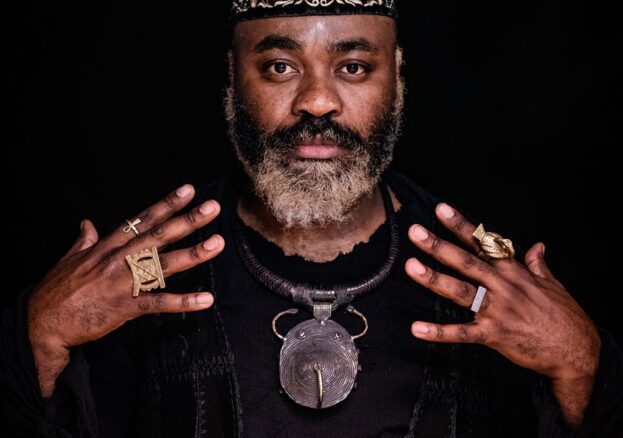
South African pianist, composer, healer, and philosopher Nduduzo Makhathini has announced the June 7 release of his third Blue Note album uNomkhubulwane.
The transcendent three-movement suite—which pays homage to the Zulu Goddess uNomkhubulwane and explores Africa’s tragic history of oppression — features Makhathini’s trio with bassist Zwelakhe-Duma Bell le Pere on bass and drummer Francisco Mela. The album is available to pre-order now on Blue Note Store exclusive color vinyl, black vinyl, CD, or digital download. Listen to the opening track “Omnyama” which is out today.
Since making his international debut for Blue Note in 2020 with Modes of Communication: Letters From the Underworlds, Makhathini has earned widespread acclaim for the genuinely spiritual transcendence of his music. For Makhathini, a Zulu healer and educator who has delved deeply into the histories and traditions of his ancestors, improvised music has never been merely about aesthetics or idioms. As the New York Times put it when naming Modes of Communication one of the Best Jazz Albums of 2020: “In a moment when spiritual jazz has become a dangerously buzzy concept, trust a musician who has truly devoted his life to divination practices.”
uNomkhubulwane travels beyond any existing notion of music-making to offer his most profound vision of creative mysticism yet. Here the pianist seeks inspiration on a wholly metaphysical plane — using sound as a way to commune with, as he puts it, “supernatural voices.”
To say it another way, rather than relying on the celebrated work of his American and African jazz heroes, or even on the probing research in his academic fields of study, Makhathini opts here to tap into the pure essence of being — an otherworldly effort that involved “listening-hearing-sensing and establishing a relationship with an ‘elsewhere’ through some guidedness.” Throughout uNomkhubulwane, Makhathini acts as both a futurist and an ancient, venturing into the unknown by exploring concepts that return him to the dawn of time.
Remarkably, he has crafted an inviting, immersive listen that should once again impress devotees of John and Alice Coltrane, Pharoah Sanders, classic South African jazz, Makhathini’s friend and collaborator Shabaka Hutchings and other intrepid musical voyagers. uNomkhubulwane features the pianist’s trio—an intuitive unit whose extensive touring has spanned the globe over the past year—with Zwelakhe-Duma Bell le Pere, a bassist of South African descent who was born and raised in the U.S.; and the Cuban-born drummer Francisco Mela, a best-of-generation musician recognized for his work with Joe Lovano, Kenny Barron, McCoy Tyner and other lions, and for his own culture-merging work as a bandleader. The rhythm section adds passionate vocal backing, accenting and lifting up Makhathini’s sacred lead-vocal offerings.
Collectively, their touch is precise in its technique yet ethereal in its purpose — and astoundingly clairvoyant in its cohesion. On “Omnyama,” a gracefully hypnotic repeated figure bolsters the leader’s spoken-word — filled with rhythmically compelling contours and bluffs — and rousing sung incantations. The click sounds that Makhathini deploys here and elsewhere in his suite, especially the qa sound common to the Bantu languages, evoke the aural sensation of water droplets; water, at the core of the African creation story, invokes essence, which in turn invokes God.
Makhathini’s 11-track suite takes its title from the Zulu name of “God’s only daughter and a manifestation of God’s very creation purpose,” the pianist explains. “She is also believed to be a mythical rain goddess, a regulator of nature, light and fertility.” A shapeshifting force, uNomkhubulwane can manifest in the form of an animal, or a hurricane or a rainbow — the lattermost of which, Makhathini says, symbolizes her “kindness and regulation of balance.”
The project’s three movements are a kind of pathway to embracing the spirit of uNomkhubulwane — three being a number of monumental power and meaning in Africa. “In Yoruba cosmology,” Makhathini says, “number 3 represents balance and harmony [characteristics of uNomkhubulwane]. Much broader African worldviews associate number 3 with endlessness, immortality and ongoing-ness through a triple state of being; before [ancestors], here [the living] and the future [the not-yet-born].” Three is indicated directly in the music of Makhathini’s new suite — in the trio format of the band, in time signatures, in a delightful triplet feel.
The suite emerged out of a “mother song” afforded to Makhathini during the initiation process he underwent to become a healer. There, he was immersed in water in order to encounter uNomkhubulwane, who gifted him this song. “The first movement ‘Libations,'” he says, “deals with collective black memory inside a state of protest against ongoing oppression[s],” adding that “this movement invokes an eternal state of black mourning that has made us lose our ‘voices,’ and even though we still cry, we do not have tears anymore.” The second movement, ‘Water Spirits,’ deals with vital energy and restoration — a proposal of “cleansing and summoning of essence.
” The final movement, “Inner Attainment,” focuses on “freedom, hope and grace,” and the striving toward a transcendence that would bring abundance back to our current time and physical plane.As always, Makhathini’s message is ultimately one of perpetual optimism for his people, and for all people. “Essentially, this offering is an invitation to humanity to cultivate ways of being that yearn for freedom and balance,” he says. “Here I invite you to a new mode of humanism that is oriented towards singing the songs of uNomkhubulwane.”
